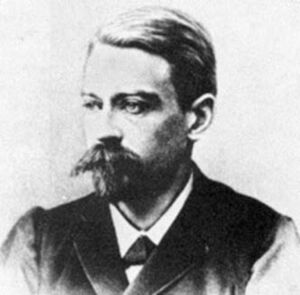Thomas Joannes Stieltjes (nonfiction): Difference between revisions
No edit summary |
|||
| Line 11: | Line 11: | ||
== In the News == | == In the News == | ||
<gallery | <gallery> | ||
File:Charles Hermite circa 1901.jpg|link=Charles Hermite (nonfiction)|[[Charles Hermite (nonfiction)|Hermite]]: "I turn with terror and horror from this lamentable scourge of continuous functions with no derivatives." | File:Charles Hermite circa 1901.jpg|link=Charles Hermite (nonfiction)|[[Charles Hermite (nonfiction)|Hermite]]: "I turn with terror and horror from this lamentable scourge of continuous functions with no derivatives." | ||
</gallery> | </gallery> | ||
== Fiction cross-reference == | == Fiction cross-reference == | ||
* [[Crimes against mathematical constants]] | |||
* [[Gnomon algorithm]] | |||
* [[Mathematics]] | |||
== Nonfiction cross-reference == | == Nonfiction cross-reference == | ||
* [[Charles Hermite (nonfiction)]] | * [[Jean Gaston Darboux (nonfiction)]] - Doctoral advisor | ||
* [[Charles Hermite (nonfiction)]] - Doctoral advisor | |||
External links: | External links: | ||
Revision as of 20:26, 1 February 2018
Thomas Joannes Stieltjes (29 December 1856 – 31 December 1894) was a Dutch mathematician. He was born in Zwolle and died in Toulouse, France. He was a pioneer in the field of moment problems and contributed to the study of continued fractions.
The Thomas Stieltjes Institute for Mathematics at the University of Leiden, dissolved in 2011, was named after him, as is the Riemann–Stieltjes integral.
Stieltjes began a correspondence with Charles Hermite which lasted for the rest of his life. Stieltjes originally wrote to Hermite concerning celestial mechanics, but the subject quickly turned to mathematics and he began to devote his spare time to mathematical research.
Stieltjes worked on almost all branches of analysis, continued fractions and number theory, and for his work, he is sometimes called "the father of the analytic theory of continued fractions".
His work is also seen as important as a first step towards the theory of Hilbert spaces. Other important contributions to mathematics that he made involved discontinuous functions and divergent series, differential equations, interpolation, the gamma function and elliptic functions.
In the News
Hermite: "I turn with terror and horror from this lamentable scourge of continuous functions with no derivatives."
Fiction cross-reference
Nonfiction cross-reference
- Jean Gaston Darboux (nonfiction) - Doctoral advisor
- Charles Hermite (nonfiction) - Doctoral advisor
External links:
- Thomas Joannes Stieltjes @ Wikipedia

